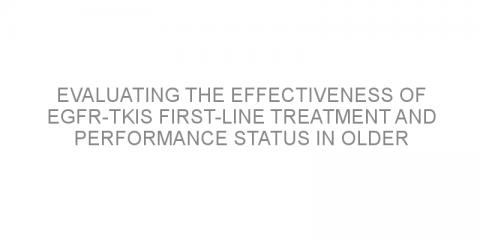In a nutshell This study evaluated the effectiveness of epidermal growth factor receptor (EGFR) tyrosine kinase inhibitors (TKIs) first-line treatment and performance status in older patients with EGFR-mutant non-small-cell lung cancer (NSCLC). The data showed that older patients with EGFR-mutated NSCLC who received EGFR-TKI first-line treatment with a...
Read MoreLibrary Item Posts on Medivizor
Recommendations for treatment-free remission in patients with chronic myeloid leukemia
In a nutshell The review aimed to develop recommendations for stopping tyrosine kinase inhibitor (TKI) therapy in patients with chronic myeloid leukemia CML. Some background Tyrosine kinase inhibitors (TKI) are a type of targeted therapy. TKIs have improved the survival outcomes for patients with chronic myeloid...
Read MoreWhich type of CAR T cell therapy is best for patients with relapsed or refractory large B cell lymphoma?
In a nutshell The authors compared the safety and effectiveness of lisocabtagene maraleucel (liso-cel; Breyanzi) and axicabtagene ciloleucel (axi-cel; Yescarta) in patients with relapsed or refractory (r/r) large B cell lymphoma (LBCL). The study found that both treatments were similarly effective but liso-cel was better tolerated in these...
Read MoreCan urinary incontinence be treated with a combination of botox and bulking agent?
In a nutshell This study looked at the treatment of urinary incontinence (UI) with a combination of botulinum toxin (Botox) and polyacrylamide hydrogel (PAHG). This study showed that most patients achieved good UI control with this treatment. Some background UI (urine leakage) is a problem that affects many older women,...
Read MoreHow high should blood pressure be to reduce cardiovascular risks?
In a nutshell This study evaluated the optimal targets of blood pressure (BP) in older patients. It found that lowering systolic BP (SBP; BP when the heart beats) to 110-130 mmHg resulted in a lower risk of heart attack, stroke, or death compared to maintaining an SBP of 130-150 mmHg. Some background High blood pressure is a...
Read MoreIs home-based rehabilitation as effective as a hospital-based programme for stroke patients?
In a nutshell This study compared home-based rehabilitation with hospital-based rehabilitation after a stroke. It found that both programs improved balance and walking in these patients. Some background One of the most important treatments for patients who have had a stroke is rehabilitation. Rehabilitation enables patients to...
Read MoreIs fimasartan a safe and effective blood-pressure lowering treatment for older patients?
In a nutshell This study compared the safety and effectiveness of fimasartan (Kanarb) and perindopril (Coversyl Arginine) for the treatment of high blood pressure (BP) in older patients. It found that fimasartan was associated with better BP control compared to perindopril. Some background There are many different...
Read MoreComparing pessaries and disposable continence devices for managing stress incontinence
In a nutshell This study compared two treatments for stress urinary incontinence (SUI), continence pessaries (CP) and disposable intravaginal continence devices (DICD). It found that both treatments reduced symptoms of stress incontinence after 4 weeks in 75-80% of patients. Some background SUI is a condition that commonly affects women...
Read MoreImpact of 5-year baricitinib treatment for active, rheumatoid arthritis in preventing radiographic progression of joint damage.
In a nutshell This study evaluated the effect of oral baricitinib (Olumiant) on the prevention of radiographic progression of joint damage over 5 years in patients with active rheumatoid arthritis (RA). The data showed that patients treated with oral baricitinib had less radiographic progression over 5 years, compared to those initially given a...
Read MoreDo insulin analogues differ in effectiveness and safety for the treatment of diabetes?
In a nutshell This study assessed the effectiveness and safety of different long-acting and short-acting insulins for the treatment of patients with diabetes. The data supported the use of long-acting insulins instead of neutral protamine Hagedorn (NPH) insulin (Humulin N; Novolin N), as basal insulin for patients with type 2 diabetes (T2D). Some...
Read MoreExtended therapy with letrozole for 5 years improves survival outcomes in postmenopausal patients with hormone positive early-stage breast cancer.
In a nutshell This study compared the effectiveness and safety of extended therapy with letrozole (LET; Femara) for 5 years versus the standard therapy of 2-3 years for the treatment of postmenopausal women with early-stage breast cancer (BC). The data showed that extended treatment with LET for 5 years significantly improved the survival outcomes...
Read MoreEvaluating the effectiveness and safety of capecitabine maintenance versus active monitoring for the treatment of patients with metastatic colorectal cancer.
In a nutshell This study investigated the effectiveness and safety of capecitabine (Xeloda) as maintenance therapy versus active monitoring for the treatment of patients with stable metastatic colorectal cancer (mCRC). The data showed that capecitabine maintenance improved survival without cancer worsening with manageable side effects for these...
Read More














